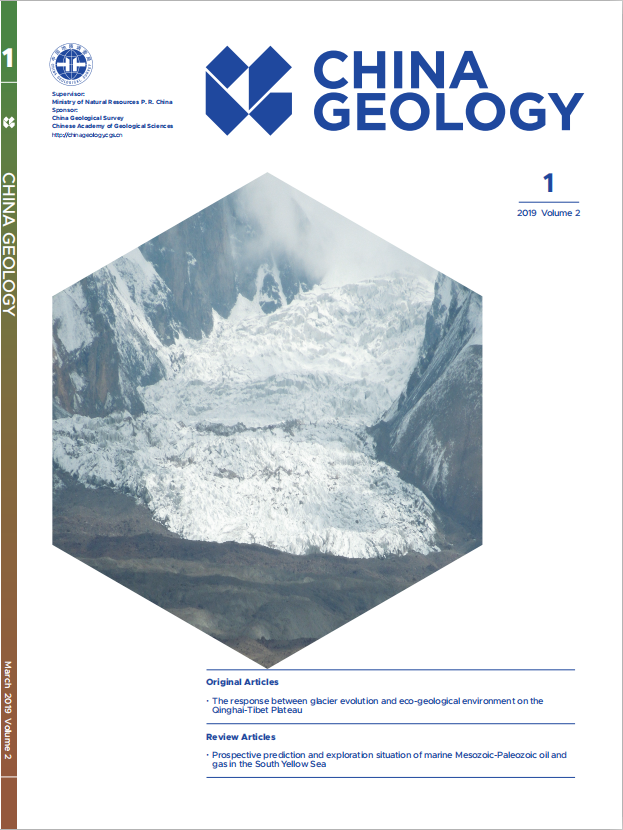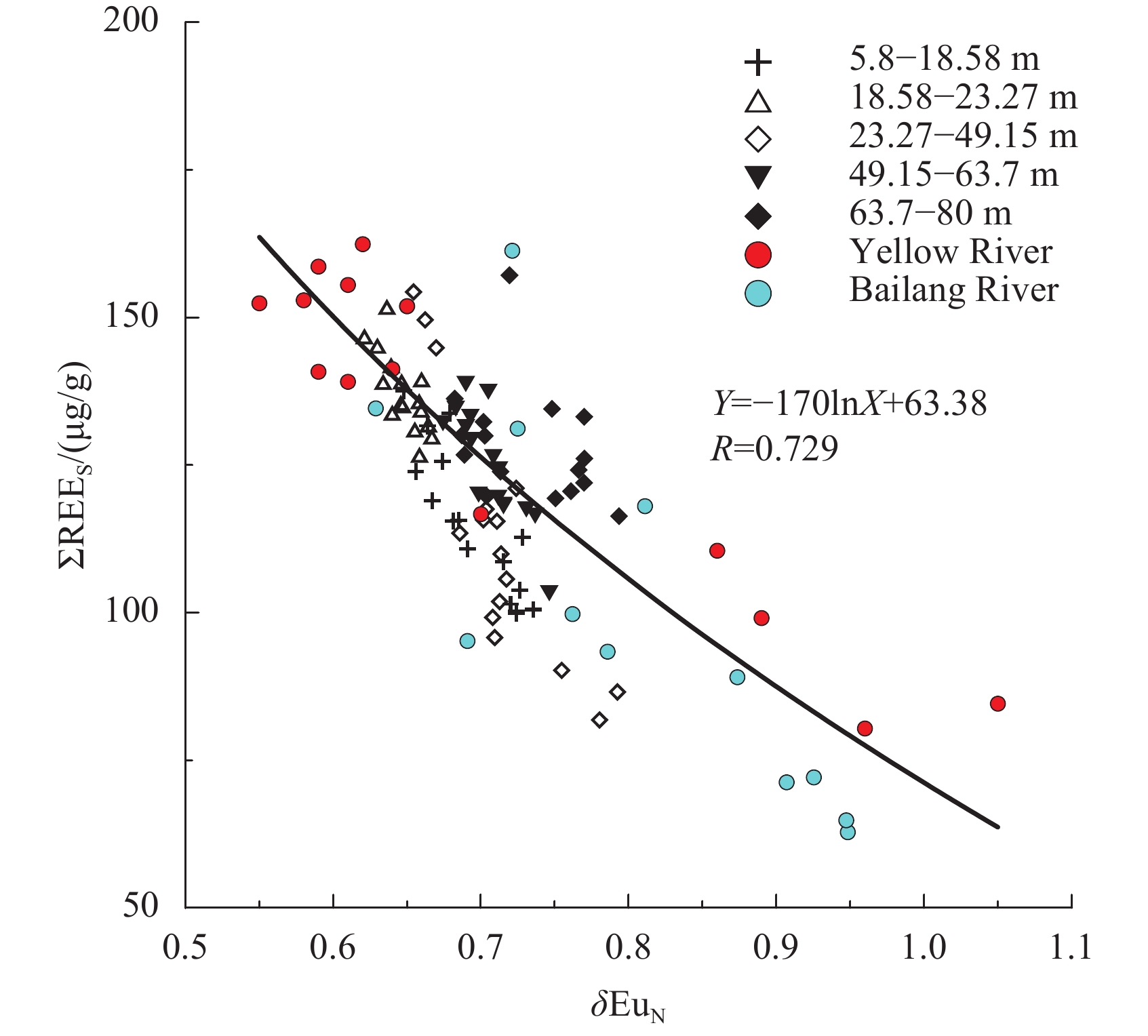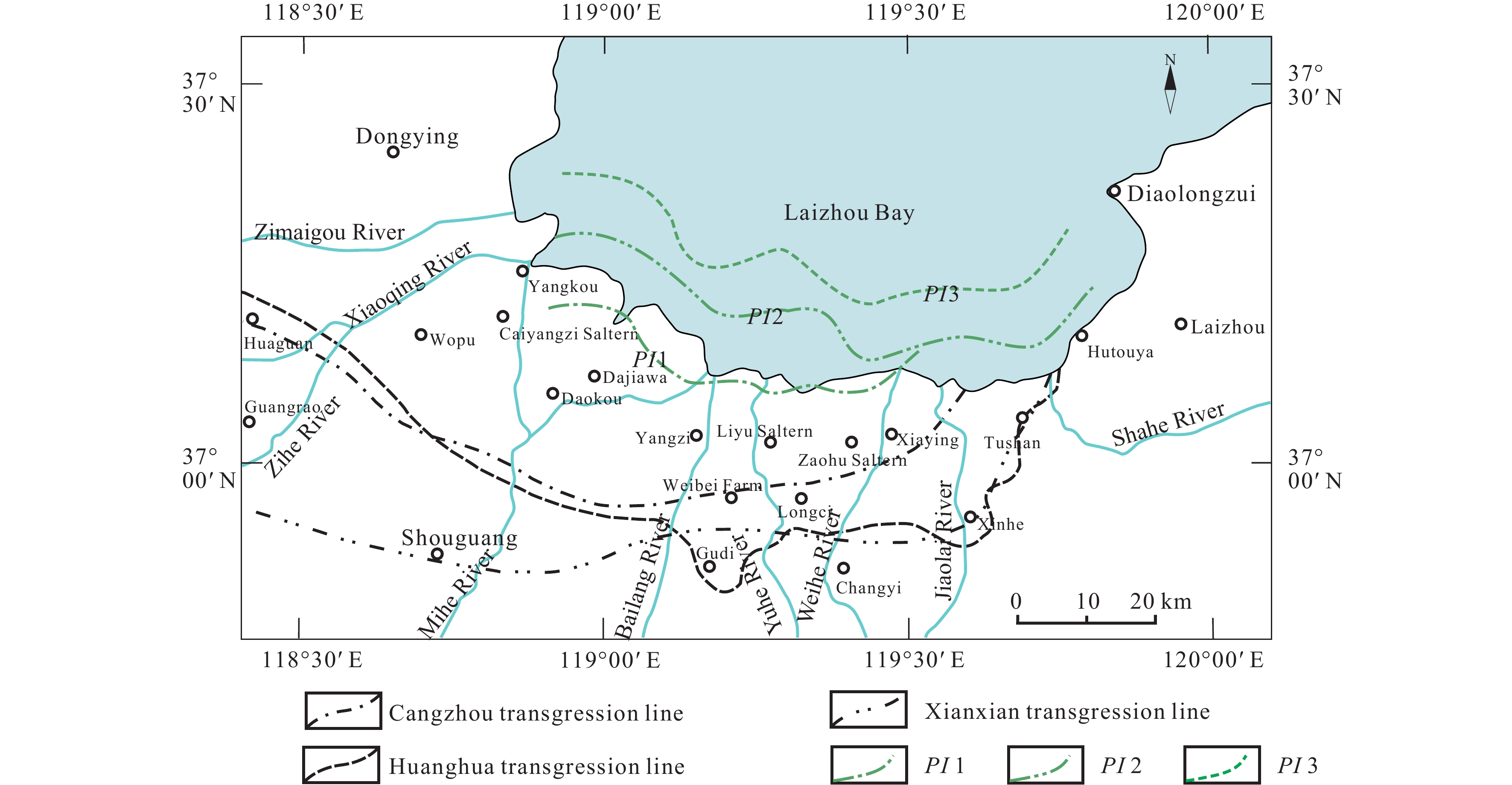| Citation: | Mao-sheng Gao, Fei Guo, Xue-yong Huang, Guo-hua Hou, 2019. Sediment distribution and provenance since Late Pleistocene in Laizhou Bay, Bohai Sea, China, China Geology, 2, 16-25. doi: 10.31035/cg2018062 |
Sediment distribution and provenance since Late Pleistocene in Laizhou Bay, Bohai Sea, China
-
Abstract
There are three transgression-regression events and evolutions of the sedimentary environment by sea level changes since the Pleistocene in the southern section of the Bohai Sea, China. It is obvious that a multi-source fluvial delta sedimentary system may be more dominant in a sedimentary environment. Based on previous research and survey or historical data, we carried out studies on the division of sedimentary units, sedimentary facies analysis and strata division and comparison, which aim to establish the sedimentary stratigraph of Laizhou Bay. We focus on the sedimentary procession of the Laizhou Bay since the early Late Pleistocene. It can be divided into two glacial periods and three interglacial periods, corresponding to two regression and three transgression events in Laizhou Bay since Late Pleistocene. In 124.6−72.0 ka BP, 60.0−24.4 ka BP and 10.2−4.0 ka BP, three times warm-wet periods occurred, respectively corresponding to the Cangzhou transgression, Xianxian transgression, and Huanghua transgression. In 72.0−60.0 ka BP and 24.4−10.2 ka BP, two dry and cold periods, it was the continental sedimentary environment, corresponding to Wurm early glacier and Wurm late glacier. The results show: (1) Sediments have the characteristics of phase and stage under the terrestrial input of the Yellow River and middle-small rivers in the southern section of the Bohai Sea. (2) PI moved towards coastal in Cangzhou transgression strata in early Late Pleistocene. PI moved northward from land in Xianxian transgression strata in the late Pleistocene. PI moved further north in the Huanghua transgression strata in Holocene. (3) During the regressive period, the land source input increased and the estuarine or lagoon sedimentation developed, which manifested as progradational superposition. (4) During the transgressive period, it mainly developed shallow coastal sediment and transitionally formed regressive deposition to the south in delta/tidal flat deposition.
-
Keywords:
- Late Pleistocene /
- Holocene /
- PI /
- Sediment /
- Laizhou Bay
-

-
References
[1] Bhatia MR. 1983. Plate tectonics and geochemical composition of sandstones. Journal of Geology, 93(91), 611–627. [2] Cao YC, Wang YH, Xu TY, Mi LS. 2007. Application of the ratio of characteristic elements in provenance analysis. Acta Sedimentologic Sinica, 25(2), 230–238 (in Chinese with English abstract). [3] Chen YS, Li JF, Wang F. 2016. Records of Holocene sedimentation environment and relative sea level by the boreholes collected along the present shoreline of the west coast of Bohai Bay, China. Journal of Jilin university (Earth science edition), 46(2), 499–517 (in Chinese with English abstract). [4] Condie KC, Phillip DN, Conway CM. 1992. Geochemical and detrital mode evidence for two sources of early Proterozoic sedimentary rocks from Tonto Basin Supergroup. Sediment Geol, 77, 51–76. doi: 10.1016/0037-0738(92)90103-X [5] Cullers R. 1988. Mineralogical and chemical changes of soil and stream sediment formed by intense weathering of Danburg granite, Georgia. Lithos, 21, 301–314. doi: 10.1016/0024-4937(88)90035-7 [6] Duan XY, Li YX, Li XG, Yin P. 2018. Historical records and the sources of polycyclic aromatic hydrocarbons in the East China Sea. China Geology, 1(4), 505–511. [7] Feng R, Kerrich R. 1990. Geochemistry of ne-grained clastic sediments in the Archean Abitibi greenstone belt, Canada: implications for provenance and tectonic setting. Geochim, 54, 1061–1081. doi: 10.1016/0016-7037(90)90439-R [8] Gao MS, Zheng YM, Liu S. 2015. Palaeogeographic condition for origin of underground brine in southern coast of Laizhou Bay, Bohai Sea. Geological Review, 61(2), 393–400 (in Chinese with English abstract). [9] Garver JI, Scott TJ. 1995. Trace elements in shale as indicators of crustal provenance and terrane accretion in the southern Canadian Cordillera. Geol. Soc. Am. Bull., 107, 440–453. doi: 10.1130/0016-7606(1995)107<0440:TEISAI>2.3.CO;2 [10] Gu SC, Chen SM, Wu BH. 1989. REE geochemistry in surface sediments of South China Sea. Tropic Oceanology, 8(2), 93–101 (in Chinese with English abstract). [11] Guo F, Gao MS, Hou GH, Liu S, WJ. 2017. Source tracing of rare earth elements: a case study of core 07 on the southern coast of Laizhou Bay. Continental Shelf Research, 136, 29–38. doi: 10.1016/j.csr.2017.01.002 [12] Guo F, Gao MS, Hou GH. 2016. Geochemical characteristics of sediment in core 07 since the Late Pleistocene in Laizhou Bay. Acta Oceanologic Sinica, 38(3), 145–155 (in Chinese with English abstract). [13] Han DL. 2001. Geochemistry of core E in the Laizhou Bay since late stage of Middle Pleistocene. Acta Oceanologic Sinica, 23(2), 79–85 (in Chinese with English abstract). [14] Han YS, Wu HF. 1982. The origin of underground brines in the coastal plain of Laizhou Bay. Geological Review, 28(2), 126–131 (in Chinese with English abstract). [15] Holail HM, Moghazi AKM. 1998. Provenance, tectonic setting and geochemistry of greywackes and siltstones of the Late Precambrian Hammamat Group, Egypt. Sediment. Geol, 116, 227–250. doi: 10.1016/S0037-0738(97)00104-8 [16] Kremer HH. 2004. River catchment-coastal sea interaction and human dimensions. Regional Environmental Change, 4(1), 1–4. doi: 10.1007/s10113-003-0066-3 [17] Lan XH, Li RH, Wang ZB. 2017. Geochemical records of surface sediments in the western Bohai Sea. Marine Geology&Quaternary Geology, 37(03), 75–85 (in Chinese with English abstract). [18] Lan XH, Zhang XJ, Zhao GT. 2009. Distributions of rare earth elements in sediments from core NT1 of the South Yellow Sea and their provenance discrimination. Geochimica, 38(4), 123–132 (in Chinese with English abstract). [19] Lan XH, Zhang ZX, Li RH. 2010. Provenance study of sediments in core NT2 of the South Yellow Sea. Acta Sedimentologica Sinica, 28(6), 1182–1189 (in Chinese with English abstract). [20] Li SJ, Cui XH, Xu Hua, Zhang Z, Zhao XL, Gao ZJ, Liu Q, Liu X. 2017. Distribution characteristics of benthic foraminifera of the late Quaternary in Laizhou Bay, Bohai Sea. China and its paleoenironmental significance. Acta Geologica Sinica, 91(2), 287–301 (in Chinese with English abstract). [21] Lim DI, Jung HS, Choi JY. 2006. Geochemical compositions of river and shelf sediments in the Yellow Sea: grain-size normalization and sediment provenance. Continental Shelf Research, 26(1), 15–24. doi: 10.1016/j.csr.2005.10.001 [22] Liu EF, Zhang ZL, Shen J. 2004. Spore pollen records of environmental change on south coast plain of Laizhou Bay since the Late Pleistocene. Journal of Palaeogeography, 6(1), 78–84 (in Chinese with English abstract). [23] Liu JG, Li AC, Chen MH. 2007. Geochemical characteristics of sediments in the Bohai Sea mud area during Holocene. Geochimica, 36(6), 633–637 (in Chinese with English abstract). [24] McLennan SM, Taylor SR. 1983. Geochemical evolution of the Archean shales from South Africa. The Swaziland and Pongola supergroups. Precambrian Res, 22, 93–124. doi: 10.1016/0301-9268(83)90060-8 [25] Nesbitt HW, Young GM. 1996. Petrogenesis of sediments in the absence of chemical weathering. Sedimentology, 43, 341–358. doi: 10.1046/j.1365-3091.1996.d01-12.x [26] Nesbitt WH, Markovics G. 1997. Weathering of granodioritic crust, long term storage of elements in weathering profiles, and petrogenesis of siliciclastic sediments. Geochimical & Cosmochimica Acta, 61(8), 1653–1670. [27] Pang SJ, Ye SY, Su X. 2008. REE Distribution characteristics of coastal wetlands surface soil from the Yellow River delta. Acta Geoscientica Sinica, 29(5), 607–612 (in Chinese with English abstract). [28] Peng ZC, Han Y, Han YS. 1992. The study of the changes of sedimental envioonmentals in the Laizhou Bay. Geological Review, (4), 360–367 (in Chinese with English abstract). [29] Plink, B P. 2010. Stacked fluvial and tide-dominated estuarine deposits in high frequency (fourth order) sequences of the Eocene Central Basin, Spitsbergen. Sedimentology, 52(2), 391–428. [30] Qin YS. 1985. Bohai Geology. Beijing: Science Press, 215–219 (in Chinese). [31] Shi XF, Chen LR, Ma JG. 1996. REE geochemistry of sediments from West Philipping Sea. Acta Mineralogica Sinica, 16(3), 260–267 (in Chinese with English abstract). [32] Singh P, Rajamani V. 2001a. Geochemistry of the floodplain sediments of the Kaveri River, Southern India. J. Sediment. Res, 71(1), 50–60. doi: 10.1306/042800710050 [33] Singh P, Rajamani V. 2001b. REE geochemistry of recent clastic sediments from the Kaveri floodplains, Southern India: implication to source area weathering and sedimentary processes Geochim. Cosmochim. Acta, 65, 3093–3108. doi: 10.1016/S0016-7037(01)00636-6 [34] Tripathi JK, Rajamani V. 2003. Geochemistry of Delhi quartzites: implications for the provenance and source area weathering. J. Geol. Soc. India, 62, 215–226. [35] Wang HJ, Yang ZS, Li YH, Guo ZG, Sun XX, Wang Y. 2007. Dispersal pattern of suspended sediment in the shear frontal zone off the Yellow River mouth. Continental Shelf Research, 27(6), 854–871. doi: 10.1016/j.csr.2006.12.002 [36] Wang H, Li JF, Pei YD. 2011. Study of Quaternary geology on the west coast of Bohai. Geological Survey and Reasearch, 35(2), 81–97 (in Chinese with English abstract). [37] Wang HX, Zhang XJ, Lan XH. 2007. Geochemistry characteristics of sediment and provenance relations of sediments in core NT1 of the South yellow Sea. J. China Univ. Geosci, 18(4), 287–298. doi: 10.1016/S1002-0705(08)60009-6 [38] Wang SH. 1979. Preliminary study of marine bed and its depositional conditions in Late Quaternary off the west coast of Laizhou Bay. Oceanology Limnology Sinica, 1, 9–23 (in Chinese with English abstract). [39] Wang ZC, Dong QD, Du XS. 2006. Active fault survey on the Tan-Lu Fault Zone in Laizhou Bay. Acta Seismologica Sinica, 28(5), 493–503 (in Chinese with English abstract). [40] Wheatcroft RA, Goni MA, Hatten JA. 2010. The role of effective discharge in the ocean delivery of particulate organic carbon by small, mountainous river systems. Limnology and Oceanography, 55(1), 161–171. doi: 10.4319/lo.2010.55.1.0161 [41] Wu MQ, Wang XJ. 1991. Rare-earth and trace elements in the East China Sea sediments. Geochimica, 20(1), 40–46 (in Chinese with English abstract). [42] Xu JS. 1994. Shell ridge and sea level change in Huanghan coast, Bohai Sea. Acta Oceanologic Sinica, 16(1), 68–77 (in Chinese with English abstract). [43] Xue CT, Ding D. 2008. Weihe River-Mihe River delta in south coast of Bohai Sea, China: sedimentary sequence and architecture. Scientia Geographica Sinica, 28(5), 672–676. [44] Yang SY, Cai JG, Li CX. 2001. New discussion about the run-through time of the Yellow River. Marine Geology & Quaternary Geology, 21(2), 15–20 (in Chinese with English abstract). [45] Yang SY, Li CX. 1999. Characteristic element composition the Yangtze and their Yellow River sediments and geological background. Marine Geology&Quaternary Geology, 19(2), 19–26 (in Chinese with English abstract). [46] Yao ZQ, Shi XF, Liu QS. 2014. Paleomagnetic and astronomical dating of sediment core BH08 from the Bohai Sea, China: implications for glacial-interglacial sedimentation. Palaeogeography, Palaeoclimatology, Palaeoecology, 393, 90–101. doi: 10.1016/j.palaeo.2013.11.012 [47] Yin P, Duan XY, Gao F, Li MN, Lü SH, Qiu JD, Zhou LY. 2018. Coastal erosion in Shandong of China: status and protection challenges. China Geology, 1(4), 512–521. [48] Zabel M, Schneider RR, Wagner T, Adegbie AT. 2001. Late Quaternary climate changes in central Africa as inferred from terrigenous input to the Niger Fan. Quaternary Research, 56(2), 207–217. doi: 10.1006/qres.2001.2261 [49] Zhang J. 2011. On the critical issues of land-ocean interactions in the coastal zones. Chinese Science Bulletin, 56(24), 1956–1966 (in Chinese with English abstract). doi: 10.1360/972011-465 [50] Zhao YY, Wu MC, Li AC. 2002. Geochemistry of mud along of China and their significance. Geology in China, 29(2), 181–185 (in Chinese with English abstract). [51] Zheng YM, Gao MS, Liu S. 2014. Distribution characteristics of subsurface brine resources on the southern coast of Laizhou Bay since Late Pleistocene. Hydrogeology & Engineering Geology, 41(5), 11–17 (in Chinese with English abstract). [52] Zhuang ZY, Xu WD, Li XL. 1991. The coastline evolution on the south coast of the Bohai Sea since 6 ka BP. Journal of Ocean University of Qingdao, 21(2), 99–110 (in Chinese with English abstract). [53] Zhuang ZY, Xu WD, Liu DS. 1999. Division and environmental evolution of Late Quaternary marine beds of S3 hole in the Bohai Sea. Marine Geology & Quaternary Geology, 19(2), 27–35 (in Chinese with English abstract). -
Access History

-
Figure 1.
Study area and cores in the Bohai Sea, China.
-
Figure 2.
Sedimentary stratigraphy profiles in the Bohai Sea, China. (core BH08 from Yao ZQ, 2014).
-
Figure 3.
Correlation between δEuN and ΣREEs for sediments in core 07.
-
Figure 4.
Three transgressions and PI (modified from Gao MS, 2015).





 DownLoad:
DownLoad:


